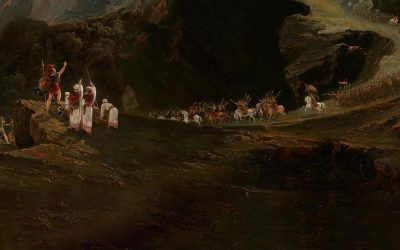Lessons from Joshua
In December 1912, a frail 72-year-old missionary named Charlotte “Lottie” Moon was quietly carried aboard a steamship, malnourished and weighing only 50 pounds. She had given away all her food during a famine in northern China, where she had served faithfully for 39 years. As she slipped into eternity, many feared the Southern Baptist mission work would collapse without her powerful voice and persuasive pen.
At the time of her death, the China mission had just under 300 missionaries and a few thousand Chinese believers, hardly a secure foundation for a global movement. Yet God’s promise to reach the nations did not sink on that ship with Lottie Moon.
Within six years, the Women’s Missionary Union renamed their annual appeal the “Lottie Moon Christmas Offering,” and giving increased exponentially. By 2021, cumulative giving to this offering reached $5 billion, with Southern Baptists contributing a record $206.8 million in a single year. Today, over 1,800 IMB missionaries serve among 3,600 people groups worldwide.
What appeared to be the funeral for a fragile, fledgling missions organization became the launch pad for an unprecedented advance of God’s kingdom. Why? Because God’s purposes never hinge on a single human leader.
The Transition from Moses to Joshua
This same truth emerges powerfully in the opening verses of Joshua: “After the death of Moses, the servant of the Lord, the Lord said to Joshua son of Nun, Moses’ assistant: ‘Moses my servant is dead. Now therefore arise, go over this Jordan, you and all this people, into the land that I am giving to them.'” (Joshua 1:1-2, ESV)
Consider Moses’ stature among the Israelites. Deuteronomy 34:10-12 tells us: “There has not arisen a prophet since in Israel like Moses, whom the Lord knew face to face, none like him for all the signs and wonders that the Lord sent him to do in the land of Egypt… and for all the mighty power and all the great deeds of terror that Moses did in the sight of all Israel.”
Imagine the questions racing through the Israelites’ minds:
- Who will lead us now that Moses is gone?
- How can we conquer this hostile land without him?
- Who will perform miraculous signs as Moses did?
God’s answer was clear: His promise did not die when Moses died.
He had already prepared Joshua as the successor.
The Road of Redemption
This transition is part of God’s larger redemptive story:
- The Promise to Abraham (2166 BC) – God tells a 75-year-old nomad named Abram to leave his country and go to a land He would show him, promising to make him a great nation through which all families on earth would be blessed.
- Isaac and Jacob – The promise continues through Abraham’s miracle son Isaac, then through Jacob and his 12 sons who would become the 12 tribes of Israel.
- Joseph in Egypt – What appeared to be betrayal when Joseph was sold into slavery turned into preservation when he rose to power in Egypt and saved his family from famine.
- Bondage in Egypt – When “a new king arose over Egypt who did not know Joseph” (Exodus 1:8), the Israelites were oppressed. But persecution wasn’t evidence of divine absence, it became the scaffold on which God built a greater stage for His glory.
- Exodus and Wilderness – Through Moses, God delivered Israel from Egypt and led them through 40 years in the wilderness, long enough for the slave mentality to die.
- The Promised Land – Now, under Joshua’s leadership, they stand at the threshold of the Promised Land.
Lessons for Today’s Church
What can we learn from this pivotal moment in Israel’s history?
- God’s purposes are unstoppable. Neither human sin nor satanic schemes can derail God’s plans. When one leader falls, God raises another.
- God prepares successors. Long before Moses died, God was preparing Joshua through mentorship and experience. Who is God preparing around you?
- Transition moments reveal our true foundation. When human leaders change, we discover whether our faith was in the leader or in the God who called them.
- The promise received must become the promise possessed. Israel had been given the promise of the land, but they still needed to cross the Jordan and claim it.
Application for Our Lives
Many Christians today live between “promise received” and “promise possessed.” We’ve been given salvation, but are we truly living in the freedom and abundance God intends? The book of Joshua gives us clues:
- We must “cross our own rivers” of anxiety and fear
- We must face fortified strongholds of lies in our minds
- We must carve out holy space in ordinary life
- We must move from a slave mentality to a son/daughter identity
Remember Joshua 21:45: “Not one word of all the good promises that the Lord had made to the house of Israel failed; all came to pass.” This is still true today. God’s promises don’t depend on any human leader, they depend solely on His unchanging character and unstoppable purposes.
Whether you’re experiencing a leadership transition, facing an intimidating challenge, or simply trying to claim the promises God has for you, remember: God’s purposes never hinge on a single human leader. They hinge on Him alone, and He never fails.



0 Comments